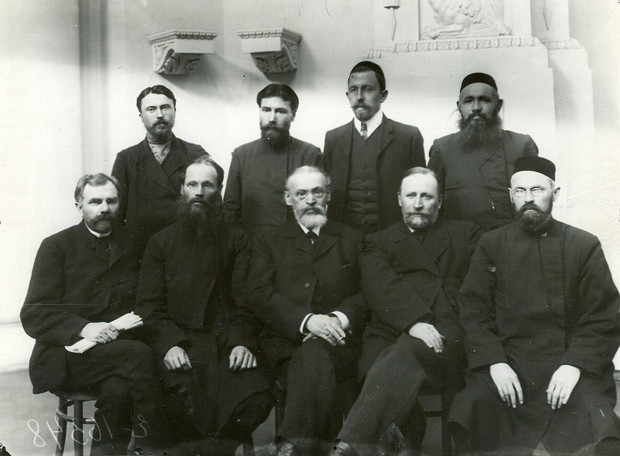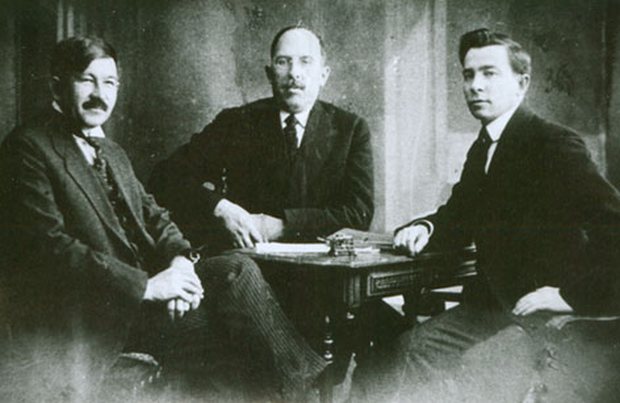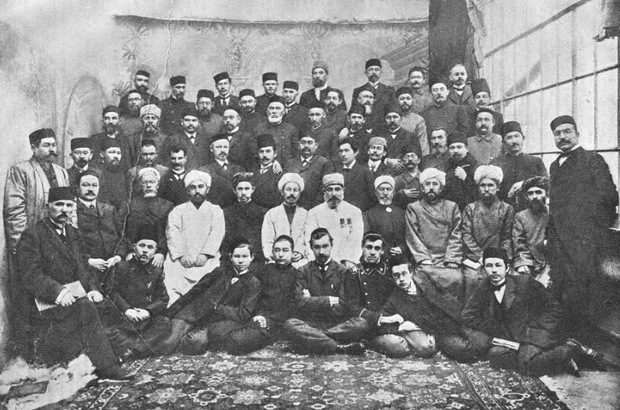Sadri Maksudi: Intellectual Bridge between Tatar and Turkish People
Life and work of a Tatar enlightener. Part 1
Despite foreign journalists' concerns, thaw in the Russia-Turkey relations gives a chance the monument to the celebrated Tatar activist Sadri Maksudi to appear in Istanbul park in Kazan. This person was one of the originators of the Turkish Republic. While the thaw is gathering speed, Realnoe Vremya remembers who Maksudi was, his merits to Tatar and Turkish people and how he united the ethnicities. Our columnist and historian Milyausha Gaynanova helped us in this work. In her first column, she tells us about Maksudi's work in Russia and abroad before his move to Turkey.
Mullah's son
Sadri Maksudi (1878—1957) is supposed to be an intellectual bridge between the Tatar and Turkish people. He is one of the most active and authoritative participants of important events and reforms in the Muslim and Turkish societies. The Tatar activist achieved great success in studies and politics and left a rich scientific heritage.
Sadretdin Nizametdin oghlu Maksudov (his full name) was born in 1878 in Tashsu village in the Kazan Governorate. His father Sadri Maksudi Nizametdin was the mullah of the village, his mother Maftukha was a respected woman – the religious leader's wife. Mullah Nizametdin's had five children: sons Akhmetkhadi and Salakhutdin, daughters Menshure, Masfufu and the youngest son Sadri.
Maksudi's life can be divided into two major stages. The first of them can be characterised as educational, social and political, that's to say, his formation as a social activist and politician. This stage lasted through his emigration from Bolshevist Russia. The second stage of his bio starts in 1918. Being isolated from his motherland, Maksudi began to study the Turkic history, taught at the Paris-Sorbonne University and then moved with his family to the Turkish Republic. He laboured for the good of the new republic to his dying day, wrote many scientific and publicistic articles, works on linguistics, Turkic history, politics and nation.

Human rights activist and State Duma activist
Maksudi got his primary education with his father in the madrasah, then studied in the Apanaev Madrasah where his brother Akhmetkhadi taught. In 1893, Sadri went to Crimea with his brother Akhmetkhadi to study in a madrasah. Here he acquainted with Ismail Gasprinsky. This meeting became a life-changing for young Maksudi. He adopted Gasprinsky's ideas about the Turkish unity and considered Ismail Gasprinsky his spiritual father to his dying day. On his mentor's advice, Maksudi went to Turkey and then to Paris to study at the Paris-Sorbonne University. From 1902 to 1906, he studied Law at this university. During his studies, he closely communicated with Yusuf Akchura. They assisted History, Philosophy lessons together and listened to the lectures given by Gabriel Tarde, David Émile Durkheim, Lucien Lévy-Bruhl and other professors. Maksudi's social and political views formed in Paris. Liberalism became a close ideological movement.
In 1906, Maksudi returned to his motherland as a graduated lawyer. Right after his return, he was invited to participate in the 3 rd congress of a party called Union of Muslims in Nizhny Novgorod from 16 to 20 August. He was elected a member of the administration of the party. He was a nominee of the Union of Muslims to the 2nd State Duma of the Russian Empire. From 1907 to 1912, Sadri Maksudi was a deputy of the 1st and 2nd State Duma. In the 2nd Duma, he became a member of the Presidium. In the 3rd Duma, he was elected a secretary of the Muslim representativeness. During his work in the State Duma, the deputy defended the rights of all Muslims who lived in the Russian Empire. He mentioned the problems of national progress and path of struggle for independence. His speeches and reports used to be published in Tatar newspapers and caused an outcry of the Tatar intelligentsia.
In Sadri Maksudi's opinion, having conserved the culture, language, religion, the Tatars would be able to conserve their ethnicity and identity and develop economically like the Russians. In one of his speeches from the State Duma's rostrum, he expressed his opinion on the conservation of the nation via education. 'As for us, the Tatars, who are in the centre of Russia, we managed to conserve our nation, in spite of the constant influence of the Russian missionaries. It was possible due to the conservation of schools in our mahallahs… Conservation of the mother tongue and religion is the key task of the Muslims. Language is the foundation of a nation. If a mother tongue is not taught at primary schools, if a nation's language is not taught kids even in the smallest schools, this nation will disappear, without doubts… However, only these schools won't guarantee the existence of our nation. If our language is studied at secondary schools and universities, we will live. If not, we will gradually disappear.' His motto was: 'We were, we are, we will be'.
Maksudi's nominee did not pass to the 4 th State Duma because of fabricated data about his property qualification. Later the politician worked as a lawyer.

Political conflict with Bolsheviks and emigration
In 1910, a famous theologian and Tatar activist Musa Bigiev presented Sadri Maksudi to Kamilya, a daughter of a well-known owner of gold mines Shakir Ramiev. They married also in 1910. Later their daughters Adile and Naile were born. Adile Ayda became the first feminine diplomat of Turkey, the author of books on the ancient history of Turkic ethnicities. Adile Ayda's daughters Gönül Pultar is a Doctor of Philology, chairs the World League of the Tatars and Gülnur Üçok works in economics.
Maksudi's active political work continued after the February Revolution in 1917. He was one of the organisers and participants of the 1 st and 2nd All-Russian Congress of Muslims. In the first congress, Sadri Maksudi delivered a speech in defence of the formation of a national and cultural autonomy of the Muslims of Russia. He became the leader of unity supporters. Based on liberalism, he chose a united form of the state in which he saw a conservation of the language, religion and culture within the scope of the national and cultural autonomy of Muslims.
At the end of 1917, the Tatar activist chaired the National Assembly. In 1918, Sadri Maksudi was elected as chairman of Idel-Ural whose staff was designated. However, the Bolshevik government did not accept this organisation and banned its activity. As a result, many Tatar activists were arrested or had to emigrate.
Maksudi emigrated to Finland in 1918 because of pursuits of the Bolshevik power. In 1919, he went to Sweden. In Stockholm, he met with Yusuf Akchura. Their photo taken in this city is kept in archives. Having obtained a German transit visa and French entrance visa, Maksudi went to Paris.

In 1922, Sadri Maksudi contacted his wife with the help of his Turkish and Tatar friends and managed to move his family to Finland thanks to his acquaintances. They went to Germany. Because of a high inflation after the First World War, life in this country was relatively cheap for foreigners who had money. In Berlin, Maksudi worked in libraries, studied archives connected with the history of ancient Turkic people. When he finished his job in 1923, together with his family he moved to France. On 4 December Sadri Maksudi started to work in the Paris-Sorbonne University where he delivered lectures on the history of Turkic ethnicities.
In April 1924, Sadri Maksudi got acquainted with the first President of Turkey Mustafa Kemal at the congress of Türk Ocağı (Turkish Hearth) that took place in Ankara. Mustafa Kemal personally invited him to work for the good the new republic. Maksudi also had good relationships with Hamdullah Suphi (the Minister of Education of Turkey in 1925). Suphi solicited the Council of Minister of Turkey to grant Sadri Maksudi and his family Turkish citizenship by default. Having left his arranged life in Paris, teaching in Sorbonne, at the end of June 1925 the Tatar activist moved from France to Istanbul. He lived and worked in Turkey to his dying day.
To be continued